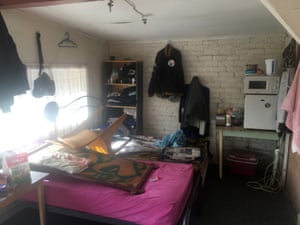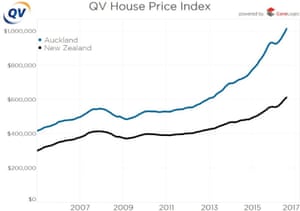Why Auckland is the hottest property market in the world
 New Zealands largest city has average house prices of $1m and for many the prices have gone too far
New Zealands largest city has average house prices of $1m and for many the prices have gone too far
What is happening in Auckland?
Its the hottest housing market in the world according to a new survey and although prime minister John Key has repeatedly declined to use the term, most New Zealanders agree Auckland is facing a housing crisis. A third of New Zealanders nearly 1.4 million people now live in the city of sails.
Ten years ago the average house price was NZ$500,000 (277,000) this week it peaked at NZ$1m and for that cash you wont be getting water views and a marble kitchen. Instead youll be able to purchase an un-renovated three-bedroom ex-state house in the citys fringe suburbs.
Average rent prices are also over NZ$500 a week, which accounts for 32% of the average household income in Auckland. Home ownership nationwide is at a 60-year-low, with figures, predictably, worst in Auckland.
Why is Auckland so popular now?
The jobs are there. Its New Zealands most global city. If you want to get ahead in your career, at some point youll probably consider moving to Auckland, or wont want to move out because you have managed to secure work.
Its also a beautiful city. Situated on Waitemata harbour, bordered by golden beaches on either side, with a sub-tropical climate and 2,003 sunshine hours a year.
Auckland also attracts New Zealanders wanting to experience a little of the glamour of an international city without having to relocate to Sydney, London or Singapore.
For minority ethnic groups, Auckland is big enough to have a vibrant and diverse dining, arts and culture scene. It is also the largest Pacific city in the world, and home to the most Mori in the country.
Immigration to New Zealand is also at record highs (69,000 in the year to July) meaning more homes are needed fast.
So who owns these properties?
Increasingly, not New Zealanders. Foreign investment in Auckland has boomed under the National party government (this is not confined to Auckland). According to Core Logic in 2012, 37% of buyers were investors. Today that proportion is nearly 50%, a significant number of whom are Chinese.
Kiwis living in Auckland are now having to choose between relocating to a more affordable part of the country (Hawkes Bay, Tauranga and New Plymouth are popular choices for those leaving Auckland) or giving up dreams of home-ownership and settling for a lifetime of renting, which isnt cheap either.
What are the downsides of the boom?
Its not been called a crisis lightly. Just before winter, stories emerged of hundreds of people living in tents, garages and shipping containers because they could not afford to rent, were on waiting lists for a state house or had given up trying.
Families with newborns were discovered sleeping in cars and under bridges and were taken in by local maraes (Mori meeting houses).

Homelessness has reached an unprecedented level and its no longer just affecting the unemployed. Some families with one or two wage-earning adults (usually in minimum-wage employment, which is NZ$15.25) are unable to afford a roof over their head. Garages with no toilet or cooking facilities are being advertised on Trade Me for NZ$500.
What about families wanting to get on the property ladder?
For young professionals and people wanting to start a family, home ownership is becoming an impossible dream.
Kirsty Johnston at media organisation NZME wrote this year: Between us, my boyfriend and I earn about $110,000 a year. We have good jobs, and some savings, and could probably scrape enough together using our Kiwisaver accounts to pay for a deposit on, say, a $400,000 home.
Even if we could afford the deposit, the mortgage on that is more than $1,100 a week. What if interest went up? Or we wanted to have a baby? Or I lost my job? Wed be ruined.
There are a few homes we could afford in the outer suburbs, but then wed be facing a three-hour commute each day. At which point, we may as well live in Hamilton. Move, you say? Why should we? I worked hard to build my career and Im not ready to give it up just yet.
So is it, like, really expensive for a coffee?
Sure is. NZ$5 for a regular latte in town is standard. A public bus from the central city to South Auckland (a distance of 17km, or 10 just over miles) costs NZ$6-9 one-way, and takes between 45-90 minutes. A commuter ferry that takes 10 minutes to cross the harbour costs NZ$6.20 one way. And to watch the new Ritchie McCaw documentary at the cinema NZ$18.50 per adult.

What are the solutions to the crisis?
On Tuesday the New Zealand government pushed through urgent legislation allowing special housing zones to be extended in Auckland for another three years, giving residential building projects special powers such as fast-tracking consent.
The local council and government are also urging New Zealanders to move to higher-density, urban living. That means apartments. Heres an interesting photo essay on Auckland apartments published last month.
Historically, Kiwis are not fond of apartment living. We love the outdoors and the kiwi dream is the detached house an a quarter-acre block.
Many banks are also reluctant to issue loans on small Auckland apartments due to concerns over poor quality and returns.
New Zealands central bank imposed strict new deposit requirements in July, making investors put down at least 40% of the purchase price in cash, which has gone some way to cooling the market.
The government has also offered people on the social housing register cash incentives (up to NZ$5,000) to move to the regions. So far 12 people have taken up that offer.
This is all kind of depressing. Any positive news to end on?
Young professionals are leading the charge to the provinces, especially those in creative industries who have the option of working remotely. Regional centres such as Dunedin, New Plymouth and Gisborne are flourishing with the injection of new talent, and even tiny towns in the deep south are experiencing a boom.
The Kiwi dream isnt dead yet, but its no longer possible without major financial sacrifices or having the will to quit Auckland, and start all over again.
Read more: https://www.theguardian.com/world/2016/sep/07/why-auckland-is-leading-the-worlds-housing-market-boom